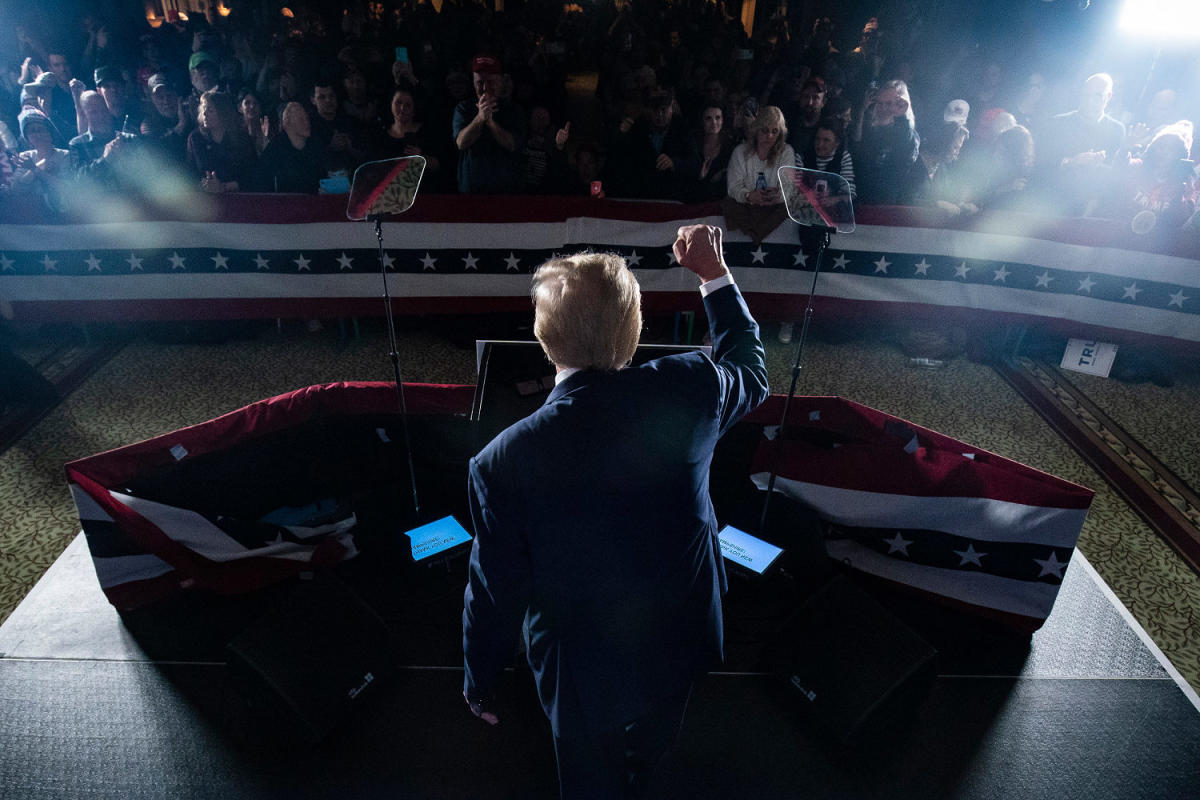The Republican National Committee could move next week to declare former President Donald Trump the “presumptive 2024 nominee” for the party’s presidential nomination.
A draft resolution anointing Trump and obtained by NBC News from two sources has been circulating among RNC members, who could vote on it at their winter meeting in Las Vegas.
The resolution asserts in part that “all evidence negates the possibility of a mathematical path forward to the 2024 Republican nomination by any candidate other than President Trump, our presumptive nominee.” The document also maintains that the RNC has “impartially [supported] the caucus/primary processes nationwide to provide a level playing field” and sponsored “robust, issues-focused” debates to help GOP voters assess the field. (The resolution leaves out the fact that Trump skipped all of those debates.)
“RESOLVED that the Republican National Committee hereby declares President Trump as our presumptive 2024 nominee for the office of President of the United States and from this moment forward moves into full general election mode welcoming supporters of all candidates as valued members of Team Trump 2024,” the resolution reads.
Trump, in a Truth Social post Thursday night, urged the RNC against advancing the resolution, though he asserted it had more than enough support to pass.
“While I greatly appreciate the Republican National Committee (RNC) wanting to make me their PRESUMPTIVE NOMINEE, and while they have far more votes than necessary to do it, I feel, for the sake of PARTY UNITY, that they should NOT go forward with this plan, but that I should do it the “Old Fashioned” way, and finish the process off AT THE BALLOT BOX,” Trump wrote.
Trump had called for the party to unify around his candidacy Tuesday night after his decisive victory in the New Hampshire primary. But Nikki Haley, his former ambassador to the United Nations, has vowed to continue her campaign, drawing fury from him.
RNC Chair Ronna McDaniel has telegraphed a desire to unite around Trump if his dominance of early caucuses and primaries continues.
“If President Trump comes out strong tonight, that’s a clear message being sent by our primary voters,” McDaniel said in a statement to NBC News before the New Hampshire results came in Tuesday. “Republicans know that if we’re not united as a party behind our nominee we won’t be able to beat Biden.”
Following Trump’s victory Tuesday, McDaniel told Fox News: “I’m looking at the map and the path going forward, and I don’t see it for Nikki Haley.”
“I do think there’s a message that’s coming out from the voters, which is very clear: We need to unite around our eventual nominee, which is going to be Donald Trump,” she added.
Asked for comment Thursday, RNC spokesperson Keith Schipper noted that McDaniel doesn’t offer resolutions.
“Resolutions, such as this one, are brought forward by members of the RNC,” Schipper said. “This will be taken up by the Resolutions Committee, and they will decide whether to send this resolution to be voted on by the 168 RNC members at our annual meeting next week.”
News of the resolution — first reported by The Dispatch, which noted it was submitted by Maryland committee member David Bossie, a close Trump ally — quickly drew complaints from other corners of the RNC.
Bossie didn’t respond to a request for comment.
Oscar Brock, an RNC member from Tennessee, said he caught wind of the resolution Thursday afternoon and feels it “certainly violates the intent” of RNC rules around the presidential primaries.
“The rules specifically say you’re not the guy until you’ve gotten 50% plus one of the delegates required for the convention,” he said, adding, “I would think that we would be more open to letting more people have a say in this process before declaring it over.”
Bill Palatucci, a committee member from New Jersey who helped lead the super PAC that supported Chris Christie’s presidential campaign, called the proposal “crazy.”
“This is insulting to the grassroots activists who wait four years for the chance to take part in the nominating process,” he said.
Gordon Ackley, the chair of the U.S. Virgin Islands GOP, which has presidential nominating caucuses scheduled for Feb. 8, also panned the proposal.
“It is unfortunate other Republicans want to deny their voters the opportunity to be heard and cast a vote,” Ackley wrote on X. “Regardless of who you support, there is a process that must be followed.”
A Haley spokesperson brushed off the proposed resolution Thursday.
“Who cares what the RNC says? We’ll let millions of Republican voters across the country decide who should be our party’s nominee, not a bunch of Washington insiders,” the spokesperson said. “If Ronna McDaniel wants to be helpful she can organize a debate in South Carolina, unless she’s also worried that Trump can’t handle being on the stage for 90 minutes with Nikki Haley.”
A source familiar with the Republican Party’s rules noted that the term “presumptive nominee” doesn’t come with any official meaning or resources under party rules. And the resolution, while it calls for the RNC to move “into full general election mode,” doesn’t require the party to take any specific, tangible steps to aid Trump.
There’s precedent for the party to declare a “presumptive nominee” and begin the tangible work of merging the campaign and the national party before the summer. In late April 2012, then-RNC Chairman Reince Priebus declared Mitt Romney the party’s “presumptive nominee,” adding that the designation was “beyond an endorsement. It is a complete merger wherein the RNC is putting all of its resources and energy behind Mitt Romney,” according to the Los Angeles Times. However, the GOP nominating contest was significantly further along by that point, with nearly all of Romney’s competitors having already dropped out.
The same source familiar with the party’s rules added that the decision to merge those resources is left to the chair of the party. But while the resolution itself may not trigger any formal shift in resources, the result would be a declaration from RNC members to McDaniel about how they may want her to handle the coming weeks or months — caught between a former president who is seen as a heavy favorite for the GOP nomination and a second-place candidate, Haley, who has won almost 30% of the delegates allocated in the first two races of the nomination.
Brock, the RNC member from Tennessee, said passing the resolution would be akin to disenfranchising millions of primary voters before Haley has even dropped out of the race. He added that while it’s traditional for the RNC to package a group of resolutions together and pass them all in the same vote, this one is more than likely to stand alone, apart from any other resolutions the party seeks to pass next week.
“There might have been other debates on other issues,” Brock said. “But they just made it to the back burner right away.”
This article was originally published on NBCNews.com








